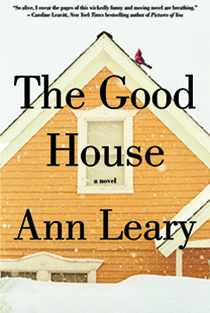 Hildy Good has gone through rehab following an intervention (an “inquisition,” she calls the shameful event) staged by her two adult daughters. Now she arrives at parties after cocktails and departs right after dinner, returns home and knocks back a few glasses of the delicious red wine she has purchased online.
Hildy Good has gone through rehab following an intervention (an “inquisition,” she calls the shameful event) staged by her two adult daughters. Now she arrives at parties after cocktails and departs right after dinner, returns home and knocks back a few glasses of the delicious red wine she has purchased online.
Yes, Hildy, the top real estate agent in Wendover, Mass., is a secret drinker, but she questions whether she is really and truly an alcoholic. She is smart and funny and functions well. Even the reader wonders what’s so terrible about Hildy winding down with a glass or two at day’s end.
Alcoholism may seem like a dire theme for what is essentially a light and bright women’s entertainment, but it works. There is no lecturing, no finger-waggling, and indeed author Leary recently said she, like Hildy, loves drinking and would certainly still be doing so were it not for the blackouts.
But this engaging novel has more going on than a 60-year-old divorcee’s drinking issues. Hildy’s town—she is the descendant of Sarah Good, one of the first women hanged for witchcraft in nearby Salem—teems with characters. There are the McAllisters, Brian, a wealthy hedge-fund founder, and Rebecca, his beautiful, idle young wife. And psychiatrist Peter Newbold, whom Hildy used to babysit and who now rents space above her office. Patch and Cassie Dwight, the young parents of Jake, a disabled boy of 9, have been trying to sell their house for a year. And Frankie Getchell, Hildy’s teenaged sweetheart, who now picks up the town’s garbage, is on hand to help with whatever needs doing.
There is love, sex, real estate, a disappearance and a death. And, predictably, a “jackpot,” which is what people in rehab call those shameful, life-wrecking events that occur when alcohol dilutes good sense.
At its heart, The Good House is a vehicle to write about that wavy, indistinct line that separates the social drinker from the alcoholic (a person who is “born three drinks short of comfortable,” as one character puts it), and it does so more effectively than any public-service campaign ever could, without sacrificing good humour, insight and intelligence.
Visit the Maclean’s Bookmarked blog for news and reviews on all things literary